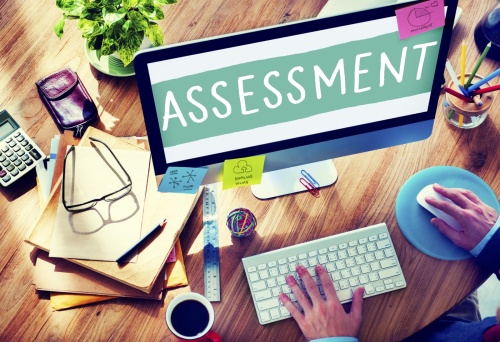The course is not scheduled for the current semester, but you can express your interest in attending below. We will take your interest into account when planning the next semester.
Background:
Evaluation is an integral part of higher education, whether it is used to assess students, evaluate courses or as a way of refining educational material. It is also an important tool for ensuring that the required levels of professional knowledge, skills and attitudes are maintened.
Oral tests play a crucial role in this process by offering a dynamic and comprehensive assessment method that goes beyond written examinations. They enable students to showcase their verbal communication skills, critical thinking and in-depth understanding of complex subjects. Through oral tests, learners learn to articulate their thoughts coherently, engage in spontaneous discussions, and defend their viewpoints, fostering essential life skills such as effective communication and self-confidence. Moreover, oral tests encourage active participation, enabling educators to provide real-time feedback if this is required as part of the assessment.
Oral testing also helps bridge the gap between theory and practical application. By incorporating oral tests into higher education, institutions promote a holistic learning experience that prepares students not only for academic success but also for success in their future careers and interpersonal interactions.
However, oral tests have some inherent limitations. Firstly, this form of evaluation can be subjective, as different examiners might interpret responses differently, leading to inconsistent grading. Additionally, time constraints during oral exams might limit comprehensive explanations, disadvantaging students who require more time to articulate complex ideas. Moreover, introverted individuals might struggle to perform under the spotlight, making it an unfair assessment for them. Therefore, these limitations suggest that incorporating diverse evaluation methods can provide a more accurate representation of a student's capabilities.
Workshop Aims: This interactive workshop aims to equip educators with effective strategies and techniques to improve the quality of oral assessments in higher education, promoting fair evaluation and enhancing student communication skills. By the end of this workshop, educators will be equipped with practical strategies, tools, and insights to effectively design, implement, and evaluate oral assessments that promote student engagement, communication skills, and overall academic success in higher education.
Learning outcomes:
Participants critically evaluate the use of oral examination to assess communication skills.
Participants understand the basic principles, practical strategies and tools to effectively design a good oral assessment RUBRIC.
Participants use blueprinting to improve exam validity.
Participants evaluate processes to ensure oral exam equity and fairness.
Duration: Half a day (4 hours)
Contents:
1. (30 minutes) Understanding the Importance of Oral Assessment
1.1 Introduction to the workshop's objectives and agenda
1.2 The What, Why, Who and How of assessment
1.3 Exploring the strengths and limitations of oral assessments
2. (30 Minutes) Designing Effective Oral Assessment Rubrics
2.1 Key components and challenges of oral assessment rubrics
2.2 Oral assessments to evaluate knowledge and skill
3. (1 hour) Hands on activity
3.1 Critical appraisal of current oral assessments within participants’ departments
3.2 Participants collaborate to develop sample rubrics for various disciplines
BREAK (15 Minutes)
4. (30 minutes) Use of simulation in oral assessments
4.1 Open discussion in relation to tools that enhance oral assessment
4.2 Role players as assessors
5. (30 Minutes) Ensuring Fairness and Consistency in Assessment
5.1 Strategies for minimizing subjectivity in oral assessment
5.2 Examination standard setting
5.3 Sharing experiences and best practices for maintaining fairness
6. (30 minutes) Overcoming Challenges and Future Trends
6.1 Identifying common challenges faced when implementing oral assessments
6.2 Collaborative activity: Participants create action plans for integrating workshop insights into their teaching practices.
7. (15 Minutes) Workshop Reflection and Closing
7.1 Reflecting on key takeaways from the workshop
7.2 Sharing individual action plans and commitments to improving oral assessments
Competences developed in the programme:
The programme develops several competences of the Framework for Effective Teaching at CU. In particular, it focuses on the following competences:
(Pillar 2) The teacher utilizes a variety of strategies that promote student active learning.
(Pillar 2) The teacher promotes an approach that respects the diversity of students.
(Pillar 3) The teacher fairly and transparently assesses whether students have met the course requirements.
(Pillar 3) The teacher encourages students to work with their mistakes, to recognize, correct and learn from them.
(Pillar 4) The teacher evaluates the extent to which expected learning outcomes have been achieved for a given course or individual class.
Lecturer: Khaled Ismail MBBCh, MSc., MD, PhD
Professor of Obstetrics and Gynaecology, Faculty of Medicine in Pilsen, Charles University.
Professor Ismail has been working as a senior clinical academic and teacher for the past 20 years. He worked as a Professor at Keele University and the University of Birmingham and served as the Honorary director of e-Learning for the Royal College of Obstetrician and Gynecologists (RCOG) in the UK. Khaled Ismail acted as an examiner at Keele, Birmingham, Cairo, Kuwait and Charles Universities and as an MRCOG examiner for the Royal College of Obstetricians and Gynaecologists. Khaled won several prestigious awards including theUniversity College London Dean’s award for teaching. He is the current chair of the European PEERS group and a member of the 4EU+ Academic Council.
Should you have any questions, do not hesitate to contact us at
